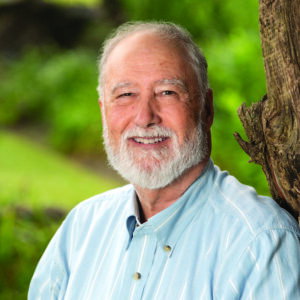John Seager ’72

Degree: B.A. in political science
Job Title: President, Population Connection in Washington, D.C.
Favorite Trinity Memory: If there was a typical pathway, I didn’t follow it. While I was intellectually prepared for college, I lacked the necessary maturity. I dropped out halfway through my sophomore year and soon discovered the world didn’t have much use for an unformed 19-year-old. Following a brief interlude, I returned to Trinity as a grown-up and worked off campus full time while taking a full course load. That taught me discipline and focus. Trinity provides extraordinary opportunities, but each student bears a personal responsibility to take advantage of them. Time is too valuable to waste at any age.
What is Population Connection, and what do you do in your role? Population Connection is America’s largest grassroots population organization, which trains more than 10,000 K–12 educators annually and is the leading U.S. advocate for voluntary international family planning. We seek to advance full reproductive autonomy for everyone everywhere. I lead this national nonprofit organization with 40,000 members and a staff of 40.
What was your path to your current position? It was a bit circuitous. Following graduation, I decided to become a carpenter. Four years later, I found myself managing what turned out to be a successful congressional campaign and eventually became chief of staff for that progressive Democratic member of Congress from Pennsylvania. After a brief stint at the U.S. Environmental Protection Agency, the same by-then former member of Congress asked me to join him at Zero Population Growth, now Population Connection. I’ve been in charge of the organization for almost 20 years now.
What do you enjoy most about your work? It’s a perfect job for a liberal arts major because it entails making connections between diverse disciplines in a complex and confounding world. F. Scott Fitzgerald’s words ring true: “The test of a first-rate intelligence is the ability to hold two opposed ideas in the mind at the same time and still retain the ability to function.” It’s an extraordinary opportunity to listen and to learn and to translate ideas into effective action.
What challenges do you face? In today’s digital maelstrom, it can be very challenging to separate the signal from the noise. Doing so requires a sense of history and an awareness of cultural differences as well as the ability to analyze data and put it into a useful context. World population has increased eightfold since 1800 and continues to grow rapidly, which puts extreme stress on both fragile ecosystems and the world’s most vulnerable people. It’s an honor to carry this work forward as part of a great team supported by wonderful members of our organization.
How did your time at Trinity prepare you for your work? I have to admit that I was that annoying person in class who would take professors off on various tangents. I’ve always been curious about everything and fascinated by seeming contradictions. To this day, I still enjoy and benefit from the kind of vigorous give-and-take that is a vital part of campus life. My time at Trinity helped me recognize the importance of scholarly research and the need to avoid assertions unsupported by evidence while never claiming omniscience.
What was the most memorable course you took at Trinity? There were several. Samuel Hendel’s class on current issues was a platform for vigorous debates about issues that are still very much in the news. Clyde McKee provided a great introduction to practical politics. And Gary Jacobson (noted below) introduced me to the “science” in political science.
Did you have a professor who was particularly influential? When I was at Trinity, I was one of several students elected to participate in Political Science Department meetings. As part of that responsibility, one of the applicants for a faculty position whom I interviewed and whom Trinity hired was Gary Jacobson, who is now distinguished emeritus professor of political science at the University of California San Diego, where I have lectured frequently (I have lectured at more than 80 colleges and universities, including Trinity). A great teacher, he is recognized as one of the most respected experts in his field. I’m proud to say he is also a friend as well as a longtime member of Population Connection.
